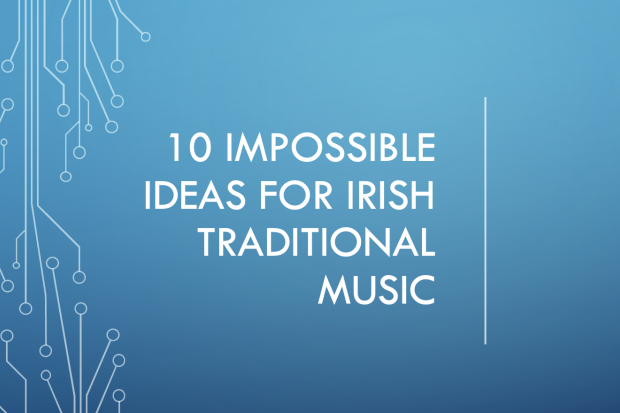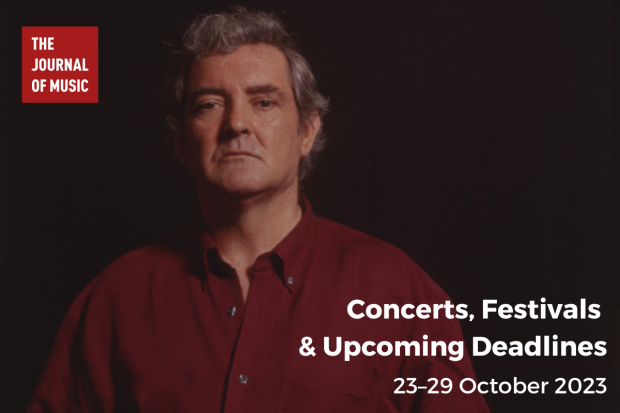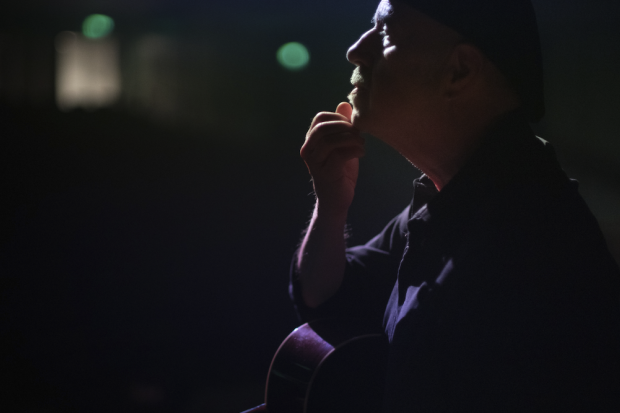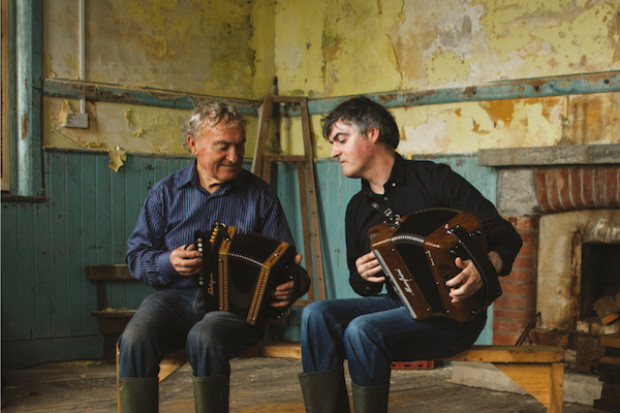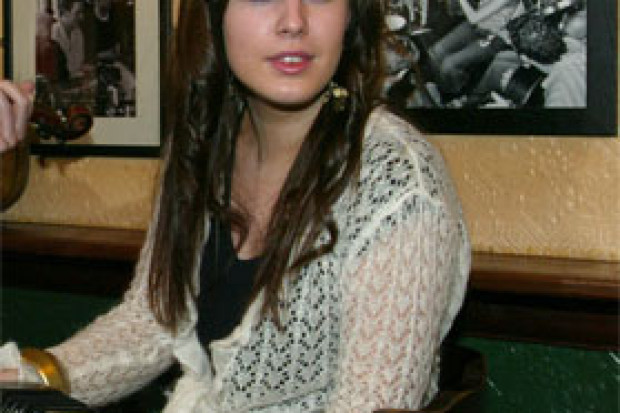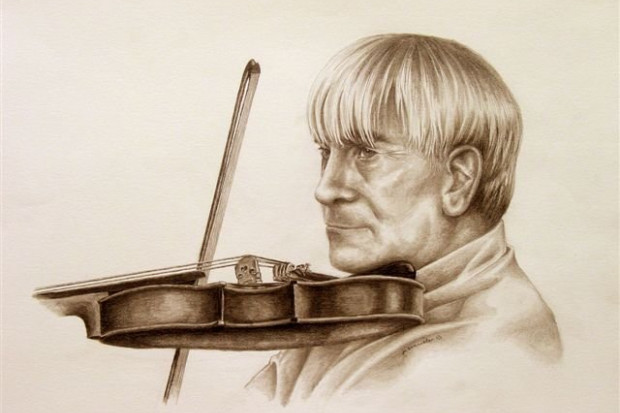Live Reviews: Temple Bar Trad 2006, Festival Concerts – Saturday & Sunday
Anyone who can play as Tommy Peoples can is entitled to operate by his own rules. He started proceedings on the Saturday night by letting us know that he did not find formal appearances like this entirely enjoyable. However, his almost diffident story-telling, interspersed with spontaneous jabs of irony and humour, drew the audience to him. The story about the one-legged protest against Stork margarine by hired labourers was hilarious. Reels were the main fare, with a few hornpipes and jigs thrown in for good measure. It is possible that nervousness affected the style of playing at times, but something else seemed to be going on as well. There was less of the high energy and characteristic ornamentation than even relatively recent recordings would have led us to expect. Instead, though Peoples would sometimes hit lovely dark, rich tones, there was also an almost tentative touch with the bow, with a searching feel to the music, as if Peoples were composing it on the spot or seeking some hidden element in it by turning it this way and that. At such times, it was as if Tommy Peoples were being drawn into the orbit of Tommy Potts, something almost unimaginable earlier in his career.
Tony O’Connell on concertina and Andy Morrow on fiddle were next up, accompanied by Arty McGlynn. This was an excellent pairing, grounded in the supple, springy sound of the concertina. At the risk of being beaten over the head by a gang of sensitive string-pluckers, I wonder if it was necessary to have the very talented Mr McGlynn on stage at all. Admittedly, he was as good an accompanist as you could ask for – a discreet presence, providing subtle counter-point and avoiding monotonous strumming. In jazz terms, however, these two players were already swinging. Their second item, a couple of reels (‘The Wren’ and ‘Joe Tom’s’), was tremendous – truly festive playing – and this level was maintained through to the end (via a fine ‘Drunken Sailor’ and a singing ‘Fred Finn’s’). It is easy to see why the musing, wandering style of Martin Hayes calls for an accompanist but shouldn’t musicians like Morrow and O’Connell have greater trust in their own gift?
There was a very different flavour to Sean Tyrell’s offering. The arrangements had a strong American flavour, even though, after starting out in Corca Dhuibhne with ‘Seal Tamall ar Strae’, he was as likely to take us from Liverpool to the Coast of Malabar as across the Atlantic. Dublin, it seems, is not this wanderer’s favourite city. He rather grumpily mentioned critics in Dublin – they might even be in the audience – who had found his singing too sentimental. If Tyrell loves his material and expresses himself as he wants to, he should travel along, singing his song (as one of the songs doesn’t quite say), entertaining the throng (which can make up its own mind), and keep gripes with critics for the pub or for the ‘Letters to the Editor’ column. After presenting a number of songs from a seated position, Tyrell decided to stand and deliver. An anthem against the slaughter of whales and other forms of destruction (the music Tyrell’s, the words Phil Gaston’s) was declaimed with particular fervour.
Seán McKeon, the piper who won the 2005 Young Traditional Musician of the Year award, led off on the Sunday evening. He is indeed a musician to watch. His piping was tight and clean, with discreet but frequent use of drones and regulators, and plenty of variation – a halfway house perhaps between the overtidy piping favoured by some younger players and the wilder full-steam-ahead style. McKeon alternated jigs and reels, and also threw in a pair of sweetly turned hornpipes (‘Ed Reavy’s’ and ‘The Stack of Barley’). The one disappointment on the night was that the only slow air (‘Caoineadh na dTrí Mhuire’) had hardly had a run-through before it was abandoned in favour of a set-dance – two versions of ‘The Hunt’, in fact. Seán McKeon will surely go on to play many slow airs and may even decide that it is insulting to slow airs to break the sustained mood they depend on so abruptly – like being moved to tears by a funeral oration, only for the speaker to dash down the aisle shouting, ‘Janey, lads, cheer up! I’m off to the pub.’
Though one sister did seem to be leader, or perhaps coordinator would be a better term, the fiddles of sisters Liz and Yvonne Kane were in such close rapport as to be inseparable. Somehow – probably through long practice and concentration – they managed to communicate the ease and rhythmic relaxation of a solo player, while also sharing with us their joint pleasure in the music itself. They told us what they were playing; they acknowledged their indebtedness to and admiration for the East Galway fiddler Paddy Fahy; they mentioned others such as Ed Reavy, Michael Coleman and Martin Hayes (a nice spread of tunes) – and on with the music. They were subtly accompanied, it has to be said, by John Blake.
And then there was Cran – for me, the most enjoyable and interesting group in the business. Any one of them could command the stage on his own: Ronan Browne, with his superb piping; Desi Wilkinson with his breathily expressive flutes and whistles, not to mention his singing and sharp humour; Seán Corcoran, with his rich, flexible voice and unshowy but endlessly varied guitar-work. Not only do Cran go from language to language (Irish, English of various kinds and dialects, Scots Gaelic), and from slow through medium to fast (their jigs and reels are as exhilarating as their airs and laments are mournful and stately), but within any song or set of tunes the surface is constantly changing as players or voices drop out and come in. We had as much of them as could be squeezed in on the night. It was a great way to end the festival but anyone who doesn’t know them should seek out these musicians, who are a festival in themselves.
Published on 1 March 2006
Barra Ó Séaghdha is a writer on cultural politics, literature and music.












